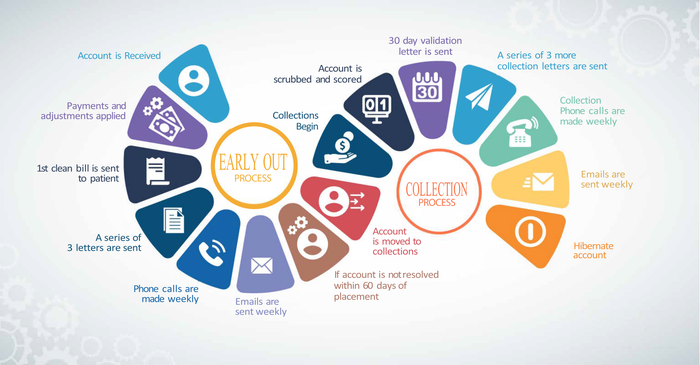In the Collections world, there are two main phases of recovery: Early Out (EO) and Bad Debt (BD) collections. There is some overlap in the meaning of these two, and it can be easy to confuse them both internally and externally.
As a company, you must get as many of your debts repaid as possible. Unfortunately, your rate of return will rarely be 100%, but debt collectors are dedicated to doing everything they can to help the situation.
Here is a diagram to help you better understand the process:

Early Out
Some health organizations offer “early out” to move fewer accounts to collections, making the overall process move more quickly. Early Out basically means you’re working with patients early in the process, informing them at the earliest possible visit what is owed and what isn’t. Patients who understand their bills are far more likely to pay them. Early Out plans typically do not fall under FDCPA guidelines as this division of the agency acts on behalf of their client. Letters, calls, electronic correspondence all fall under the Client’s logo and demographic details. The phones are just routed to the agency where they represent themselves as an Extended Business Office (EBO) for your company.
Early Out is a useful tool for your company because it is flexible. For some teams, Early Out might mean offering a discount if a person pays the bill early. Early Out might also mean:
– Payment plans
– Transparent pricing
– Discounted plans
– Range of payment channels
– Personal communication
Why Early Out?
By participating in Early Out, your patients or customers have more options for repayment, meaning you are more likely to get paid. These strategies can help to cultivate a more positive relationship between your customers or patients and you or our collection team.
As we’ve talked about, strong communication and an appropriate system can make all the difference in a collections situation.
Collections
Collections are the process of getting the money far after it is due. Companies often assign the work of debt collection to a third-party, who will then collect outstanding payments. Capital Recovery works with your company and customers to get those payments so you can manage your cash flow and maintain a healthy business.
Bad Debt
Most companies will, eventually, end up with “bad debt,” which is “an expense that a business incurs once the repayment of credit previously extended to a customer is estimated to be uncollectible.” Such debt can be a big issue for your company’s bottom line.
In this process, this division of the Agency’s company is representing itself as a Collection Agency. Letters go out with their logo, calls are answered as the agency. This promotes a sense of urgency to the debtor they may not feel when their account is still in Early Out.
When working with customers on credit, it can be hard to ensure they are going to always be able to pay you back. As a company, make sure to evaluate the risks of working with the customer prior to doing business with them. While you can write off bad debt on your taxes, obviously, you’d prefer not to have it in the first place.
For any business, it is often more practical to hire third-party debt collectors to collect any outstanding debts from customers.
At Capital Recovery, healthcare collection is our specialty. Do you have a question about collecting? Please share with us on Facebook, Twitter, or LinkedIn.

